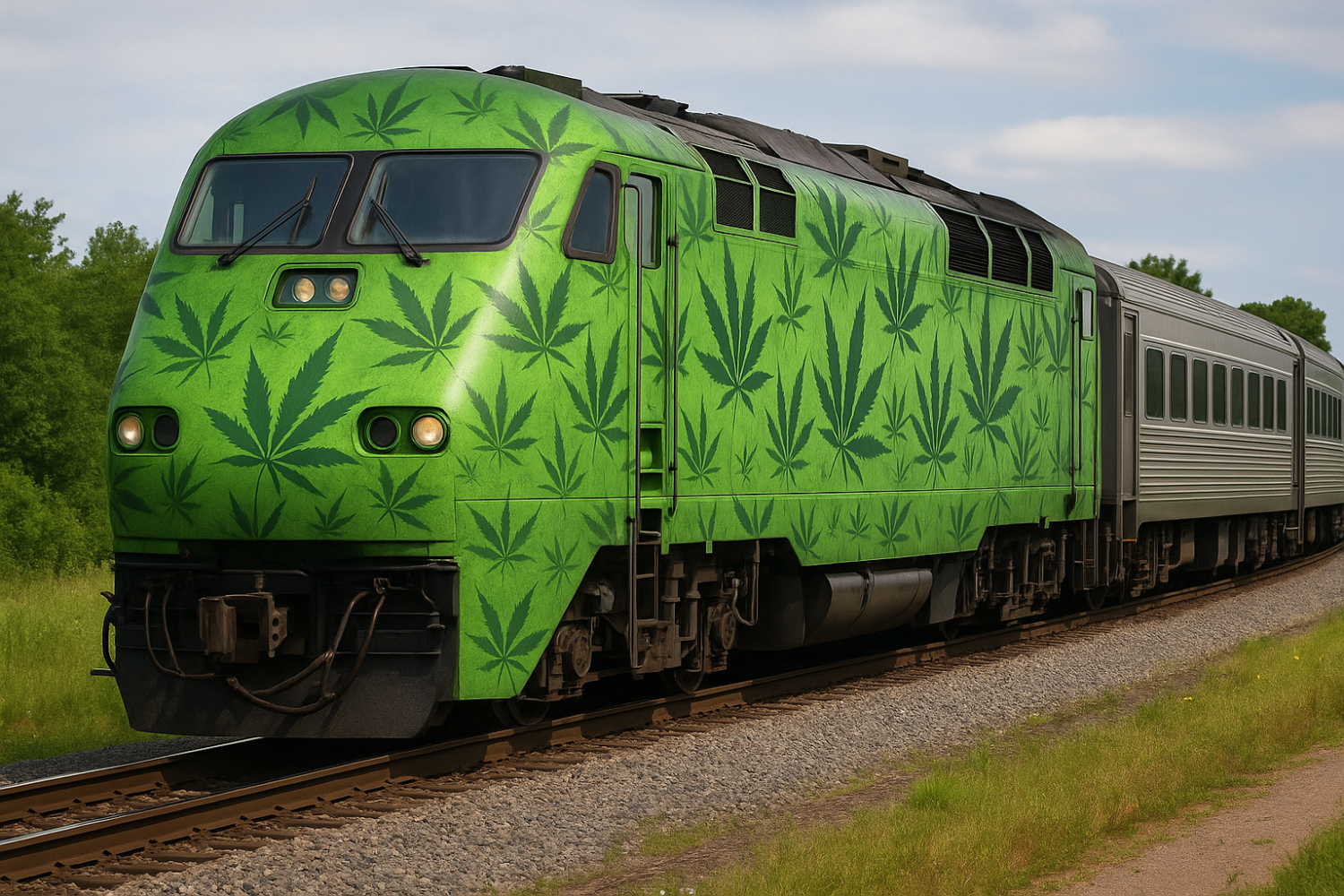The reality is this: cannabis laws vary across states and countries, and train operators almost always default to federal guidelines. Since weed remains illegal at the federal level in the United States, possession or consumption, aka traveling on trains with weed is officially prohibited. That doesn’t stop millions of riders from wondering what’s really enforced, how laws differ depending on the route, and what the potential risks are.
This article breaks it all down—so you know exactly what to expect before stepping on board.
When it comes to cannabis, travel always brings more questions than answers. Airplanes are packed with TSA rules, cars depend on state-by-state driving laws, and international trips bring the heaviest consequences. But what about trains? For people riding Amtrak, regional commuter lines, or even cross-border rail services, the rules on weed can feel like a grey area that changes with each stop.
Understanding Federal vs. State Cannabis Laws
Before digging into the details of train travel, it’s important to understand the split between state and federal law:
- State Level: Dozens of states allow medical and/or recreational cannabis. Riders boarding a train in California, Illinois, Colorado, or New York may be carrying products legally purchased at licensed dispensaries.
- Federal Level: Cannabis remains a Schedule I controlled substance under the Controlled Substances Act. Since most train services (Amtrak included) operate under federal jurisdiction, federal law technically overrules state law once you step onto the train.
This tug-of-war means that while you might be carrying weed legally in your starting city, the moment you cross state lines—or even step onto federally regulated transportation—you’re entering risky territory.
Amtrak’s Official Policy on Traveling on Trains with Weed
Amtrak’s policy is crystal clear: no marijuana allowed on trains or in stations.
The company states that because it receives federal funding and operates under federal law, passengers cannot carry or use cannabis—even if both departure and arrival stations are in states where weed is legal. This includes:
- Medical cannabis: Even with a doctor’s recommendation or medical card, Amtrak still prohibits passengers from traveling with cannabis.
- Recreational cannabis: Whether flower, vapes, or edibles, recreational products are equally banned.
- CBD and hemp: Products under 0.3% THC may be tolerated, but it depends on local law enforcement and TSA-style security screenings.
In practice, Amtrak police are responsible for enforcing the policy. Penalties can range from confiscation and fines to removal from the train, and in rare cases, referral to federal law enforcement.
What About Regional or Local Train Lines?
Not all train systems are run by Amtrak. Commuter rail lines and subways (like Chicago’s Metra, San Francisco’s BART, or New York’s MTA) often fall under state or municipal law. Here’s how that plays out:
- Legal states: Riders in California or New York may carry weed in personal amounts that fall under state possession limits, but smoking or vaping on trains remains banned.
- Illegal states: If you’re caught with cannabis in a state that hasn’t legalized it, local police could charge you with possession.
- Security levels: Unlike airports, most regional trains don’t have TSA-style checkpoints. Enforcement often depends on random searches, police presence, or whether your bag attracts attention.
The bottom line: commuter trains are generally less strict than Amtrak, but the risk still exists—especially if you’re transferring between cities or states with different laws.
Can You Travel With Weed on International Trains?
For travelers crossing borders by train—like Amtrak’s Maple Leaf (U.S. to Canada) or routes between European countries—the answer is a hard no.
- U.S.–Canada: Both countries have legal cannabis, but customs agents on both sides of the border strictly prohibit crossing with weed. Penalties can include fines, permanent bans, or arrest.
- Europe: Some EU countries are more lenient than others, but border controls vary. Even between “legal” countries like the Netherlands and Germany, carrying cannabis across borders is still illegal.
- Mexico: While cannabis reforms are underway, border checks remain strict. Do not attempt to bring cannabis by rail.
International train travel is one of the riskiest scenarios for cannabis. Always expect to go through customs and assume zero tolerance.
Common Questions: Weed on Trains
1. Can you smoke weed on a train?
No. Smoking, vaping, or consuming edibles on board is prohibited by all train companies in the U.S. and most countries abroad.
2. What if both my departure and arrival states allow cannabis?
Even then, federal law (Amtrak) prohibits cannabis. Local commuter trains may be more relaxed, but it’s still technically illegal.
3. Do trains have drug dogs or random searches?
Amtrak and border trains occasionally use K-9 units, particularly on long-distance routes and at major stations. Random bag checks can occur.
4. Can I keep weed in my luggage?
It’s still banned. If discovered, it may be confiscated, and you could face consequences.
5. What about CBD or hemp?
Hemp-derived CBD products under 0.3% THC are federally legal, but enforcement varies. Some police officers may still treat them like cannabis.
Risk Levels: Realistic Scenarios
While the law is absolute, enforcement often depends on circumstance. Here’s how the risks break down:
- Low risk: Carrying a sealed edible in a backpack on a short commuter route in a legal state.
- Medium risk: Bringing flower or vapes on a long-distance Amtrak ride where luggage may be subject to random checks.
- High risk: Crossing state lines with large quantities of cannabis or carrying weed across international borders.
Alternatives: How to Travel Safely Without Breaking Laws
If you’re set on having cannabis during your trip, here are legal alternatives:
- Buy at your destination. Most legal states have dispensaries near major train stations.
- Use CBD products. Hemp-derived products can offer relaxation without legal risk.
- Consider edibles before departure. Consuming before boarding may be less risky than carrying, though intoxication in public can still draw attention.
Why Enforcement Still Matters in 2025
Even as cannabis legalization spreads, the federal government hasn’t rescheduled or descheduled weed. Until that happens, all federally funded transportation—including Amtrak—remains under strict prohibition. With cannabis reform debates heating up in Washington, change may come, but for now, train riders need to play it safe.
FAQ About Traveling on Trains With Weed
Q1: Can you bring marijuana on an Amtrak train in 2025?
No. Amtrak prohibits marijuana possession on all trains, regardless of state laws.
Q2: What happens if you get caught with weed on a train?
You may face confiscation, fines, removal from the train, or referral to law enforcement.
Q3: Are edibles easier to carry on trains?
Edibles are less detectable, but still illegal on federally regulated trains.
Q4: Can medical marijuana patients travel by train?
Medical cards don’t override federal law. Patients are still prohibited from bringing cannabis on Amtrak.
Q5: What about weed pens or vapes on trains?
Vape pens are banned if they contain THC. Nicotine devices are allowed in some cases, but not in smoking-restricted areas.
Q6: Is CBD allowed on trains?
Yes, if it contains less than 0.3% THC and is hemp-derived, though enforcement varies.
Q7: Do commuter trains check for cannabis?
Rarely. But police patrols and random checks do happen, especially in major cities.
Q8: Can you travel with cannabis across state lines by train?
No. Crossing state lines with weed is federally illegal, whether by train, car, or plane.
Q9: Can you travel with cannabis across country borders on a train?
No. Border security strictly enforces bans, even between two legal countries.
Q10: What’s the safest way to travel with weed?
The safest method is not to bring it. Buy locally at your destination instead.
Q11: Are cannabis arrests common on trains?
Arrests are less common than at airports, but they do happen, especially on long routes.
Q12: Do Amtrak trains have drug dogs?
Yes, at some stations and on certain routes.
Q13: What happens if you hide weed in luggage?
If discovered, it will be confiscated and could result in charges.
Q14: Can you travel with cannabis seeds on trains?
Seeds are also federally illegal to transport across state lines.
Q15: Is traveling with hemp flower legal?
It’s federally legal under the 2018 Farm Bill, but hard to distinguish from cannabis, so it can cause issues.
Q16: Do police patrol trains for weed?
Yes, Amtrak Police and local law enforcement patrol trains and stations.
Q17: Can you be banned from Amtrak for weed?
Yes. Repeat violations may lead to bans.
Q18: Are there differences between Amtrak and European trains?
Yes. European rules vary by country, but carrying cannabis across borders is illegal.
Q19: What about overnight sleeper trains?
Still banned. No cannabis consumption allowed in cabins.
Q20: Can you be fined for cannabis smell on a train?
Yes. Even odor can lead to searches and penalties.
Trains have long been considered the most relaxing way to travel—no airport chaos, no highway stress. But when it comes to cannabis, they remain one of the most regulated environments. While enforcement isn’t as intense as airports, the risks are real, and the penalties can quickly ruin a trip.
As legalization continues to expand, cannabis travelers will keep pushing for more common-sense policies. For now, though, train riders should stick to the law, avoid carrying weed, and plan ahead to source cannabis legally once they arrive at their destination.
So, can you travel on trains with weed? Legally, no.
If it’s Amtrak in the U.S. or an international rail service, federal and international law make it clear that cannabis is prohibited. Local commuter trains may offer slightly more wiggle room, but enforcement can strike when you least expect it.
The safest move is always to avoid bringing weed on trains and instead buy legally at your destination.
Until federal laws change, traveling with cannabis on trains is a gamble few riders can afford to take.







